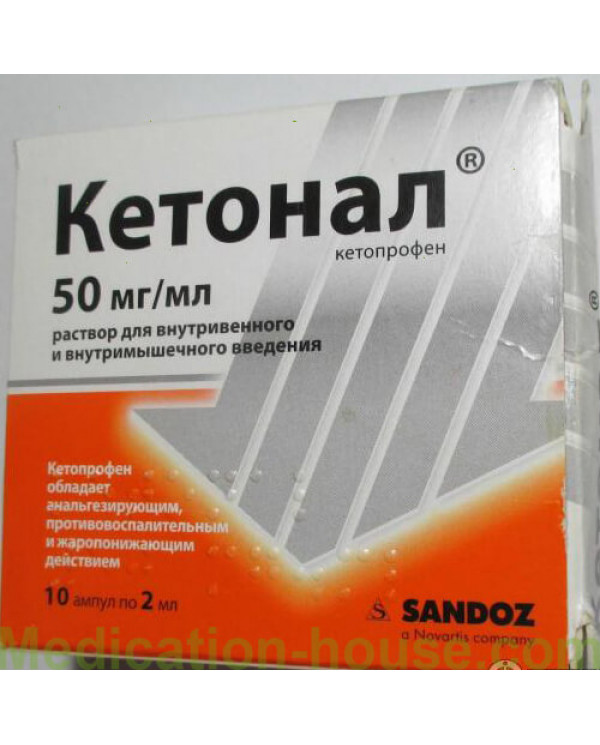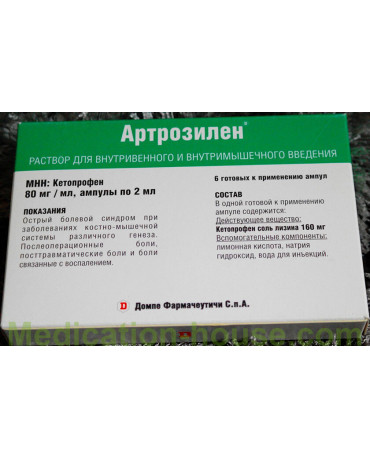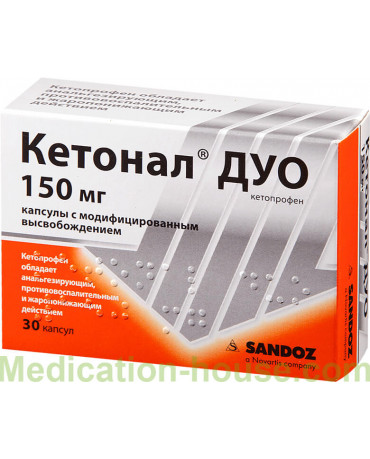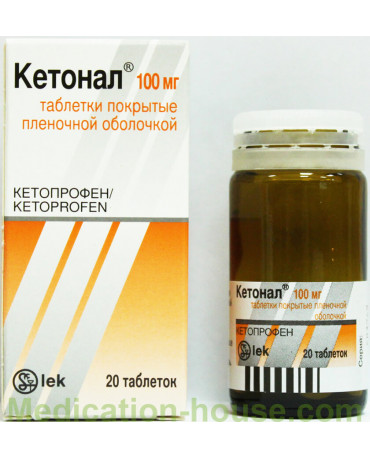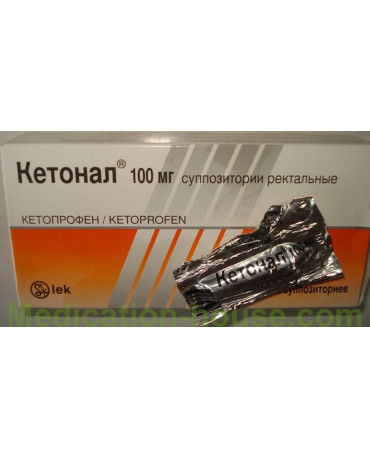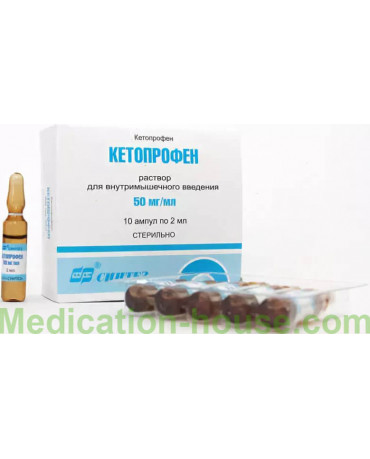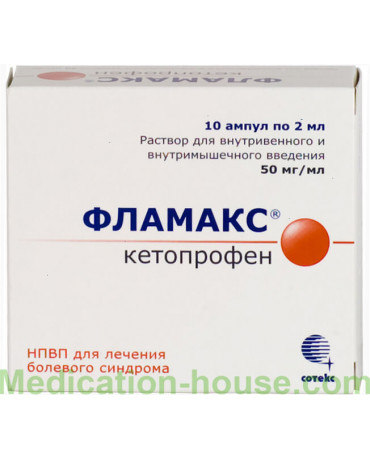Instruction for Ketonal injections
You can buy Ketonal injections on this page
The form of release of the drug, its composition and packaging
Ketonal is produced in the form of injection solution in ampoules. The solution is characterized by transparency, a slight yellowish tinge. Used for intramuscular and intravenous injections. On visual inspection, the solution should be free of sediment or mechanical impurities. Otherwise, it can not be used for introduction into the body.
1 ampoule of Ketonal solution contains 50 or 100 mg of ketoprofen, as well as additional substances: ethyl alcohol, propylene glycol, benzyl alcohol, water for injection. Ampoules of 2 ml in the amount of 5 pieces are embedded in blisters. Blisters of 1 or 2 each are enclosed in cartons with appropriate markings.
Mechanism of action
Ketoprofen is a non-steroidal anti-inflammatory drug. It has analgesic, anti-inflammatory effects, reduces body temperature. The action occurs due to inhibition of cyclooxygenase type 1 and type 2. Because of this, the production of prostaglandins is inhibited, which disrupts the development of the inflammatory reaction.
When using high concentrations of the drug, the production of leukotriene and bradykinin is also inhibited.
Ketonal injections has no detrimental effect on the condition of the cartilage tissue.
Pharmacokinetics
Ketonal injections have a high bioavailability of about 90%. The maximum concentration is fixed in the blood 15-30 minutes after the administration parenterally.
Ketoprofen has a high affinity for plasma proteins and is 99% bound to them. Well comes in synovial fluid (about 50% of the total content in the blood).
The drug undergoes intensive metabolic processes in the liver under the influence of the microsomal enzyme system. In the process of metabolism, inactive metabolites are formed. The half-life is 120 minutes. Excretion occurs through the kidneys in the form of glucuronide.
When liver dysfunction, the concentration of the drug increases due to slower metabolism. Therefore, this category of patients must use the lowest possible dosage of the drug.
In renal failure, the elimination of ketoprofen is reduced, but the dose should be adjusted only in case of severe renal dysfunction.
Slow metabolism and elimination of the drug are characteristic for elderly patients, but only cases with concomitant renal insufficiency in history are of clinical importance.
Who and when is recommended to use Ketonal injections
Ketonal injections is prescribed for the following diagnoses:
inflammatory processes of various origins
diseases of bones and joints of inflammatory and degenerative nature
arthritis of different nature and nature
gout
osteoarthritis
pains in muscles and joints of weak and moderate nature
pains in the head, including migraine
inflammation of muscles, nerves
pain after injury or surgery
pain in cancer
inflammation and pain associated with dysfunction of the pelvic organs in women.
Who and when is not recommended to use Ketonal injections
Ketonal injections should not be used if the patient has found:
reaction to other drugs from the group of NSAIDs in the form of bronchial asthma, urticaria or rhinitis
stomach ulcer or gastritis
ulcerative colitis, Crohn's disease
decreased blood coagulation, hemophilia
severe liver dysfunction
chronic severe kidney disease, organ failure
heart failure not compensatory type
period after aortic bypass surgery
bleeding from the digestive tract or other
chronic dyspeptic symptoms
age less than 15 years
breastfeeding period
third trimester pregnancy
individual intolerance to the ingredients of the drug.
Care must be taken in case of concomitant asthma and gastric ulcer, heart and vascular diseases, liver and / or kidney dysfunctions, problems with the functioning of the gastrointestinal tract, blood clotting disorders, alcohol abuse and smoking, aspirin intolerance, and diabetes.
How to apply
Ketonal injections are used for intramuscular and intravenous administration.
Intramuscular injection of 100 mg with a frequency of 1-2 times per day.
Intravenous drug is administered only in a hospital setting. 1-2 vials of the drug diluted with saline volume of 100 ml. The resulting solution is injected for 30-60 minutes. After 8 hours, the intravenous injection can be repeated.
There is also the option of a longer drug administration. in the same way, 1-2 ampoules of injections Ketonal are diluted in 500 ml of sodium chloride or Ringer's solution and injected intravenously over 8 hours. Repetition of the injection is possible 8 hours after the end of the previous injection.
Ketoprofen can be used in combination with analgesics of the central type of action, including opioid ones. You can enter in the same syringe with other analgesics other than tramadol due to the formation of sediment.
In addition to injection, it is possible to take Ketonal tablets or capsules in the complex, as well as to use the rectal form of the drug release. You can consume up to 200 mg ketoprofen a day.
Symptoms of an overdose of the drug Ketonal injections
With the introduction of excessive doses of the drug, the following symptoms are observed: dyspepsia, vomiting with blood, gastralgia, depression of the respiratory center, seizures, liver and / or kidney dysfunction.
Therapy: gastric lavage and taking sorbent preparations. If necessary, treat according to the observed symptoms. In case of a pronounced negative effect on the gastrointestinal tract sections, drugs should be taken from the group of proton pump inhibitors. In cases of severe renal impairment, hemodialysis should be performed.
Interaction Ketonal injections with other drugs
Ketonal injections reduces the effectiveness of diuretic and antihypertensive drugs.
Ketonal injections induces the effects of oral hypoglycemic agents and some of the anticonvulsant agents.
Parallel administration of ketoprofen together with other anti-inflammatory drugs, glucocorticosteroids, ethyl alcohol leads to an increase in rice lesions in the gastrointestinal tract.
Drugs affecting blood coagulation - anticoagulants, antiplatelet agents, thrombolytics when co-administered with injections Ketonal lead to the development of bleeding.
It is possible to increase the content of potassium in the blood while taking ketoprofen in parallel with an ACE inhibitor, other NSAIDs, heparin, trimethoprim.
Ketonal injections increases the content of SG, calcium channel antagonists, methotrexate.
When taken together with methotrexate and cyclosporine, the toxicity of these drugs is significantly increased.
The use of Ketonal injections during pregnancy and lactation
Studies have shown that the use of a group of NSAIDs during pregnancy increases the risk of spontaneous abortion, there is a detrimental effect on the embryonic development of a child with the possible formation of heart defects.
The use of the drug in the 1st and 2nd trimester of pregnancy is allowed only when assessing the ratio of benefit to the mother / risk to the fetus.
The use of Ketonal injections during the third trimester is contraindicated due to a decrease in generic activity, the development of renal dysfunction.
No data on the possibility of penetration of ketoprofen in breast milk. Therefore, in the appointment of this drug in the period of lactation should decide on the termination of breastfeeding a child.
Side effects
From the side of blood formation: decrease in the level of leukocytes, platelets, anemia of hemorrhagic type, impaired functioning of the bone marrow.
Immunity: anaphylaxis.
From the side of the central nervous system: pain in the head, sleep disturbance, decreased sensitivity, convulsions, disturbed taste buds.
From the side of view: reduced visual acuity.
From the ear: noises.
From the side of the heart and blood vessels: heart failure, high blood pressure, expansion of peripheral vessels.
On the part of the respiration: bleeding from the nose, swelling of the laryngeal tissue, bronchospasm, asthmatic status.
On the side of the stomach and intestines: dyspepsia, pain, upset or constipation, flatulence, inflammation of the gastric mucosa, deterioration of Crohn's disease, bleeding from the intestines, perforation of the intestinal wall or stomach.
On the part of the hepato-biliary system: inflammation of the liver, increased enzyme levels.
Skin: rash, itching, swelling, baldness, redness, necrolysis.
On the part of the kidneys: organ dysfunction, inflammatory process.
Others: fatigue, swelling, weight gain.
How to store
Ketonal injections should be stored at a temperature not higher than 250 C, not more than 3 years from the moment of release of the drug. Keep out of the reach of children.
special instructions
With long-term use of the drug for treatment, it is necessary to periodically monitor the performance of the liver and kidneys, analyze the blood picture, perform an analysis of fecal occult blood.
In the presence of cardiovascular diseases, patients taking ketoprofen should be more likely to measure blood pressure and be careful.
If the reception of the drug recorded vision loss should be immediately abolish the use of Ketonal injections.
Ketonal injections can hide signs of inflammation in the body associated with infection. Therefore, in the presence of symptoms of infection and deterioration of the patient's condition, it is necessary to urgently consult a doctor.
Patients receiving high doses of the drug should be carefully monitored for a long time if they have problems with the gastrointestinal tract.
The drug can reduce the ability of women to conceive, therefore, should not be used to treat women with infertility.
The ability to drive a vehicle after taking injections Ketonal depends on the individual tolerance of the drug. If there are adverse reactions in the form of drowsiness, dizziness. Visual impairment, it is necessary to keep from driving and other work associated with increased attention and reaction.
The drug can be used for elderly patients, keeping under control the performance of the kidneys and liver.
Ketonal injections are not recommended for children. The minimum age for the use of the drug is 15 years.
Terms of sell
You can buy Ketonal injections without a prescription.

